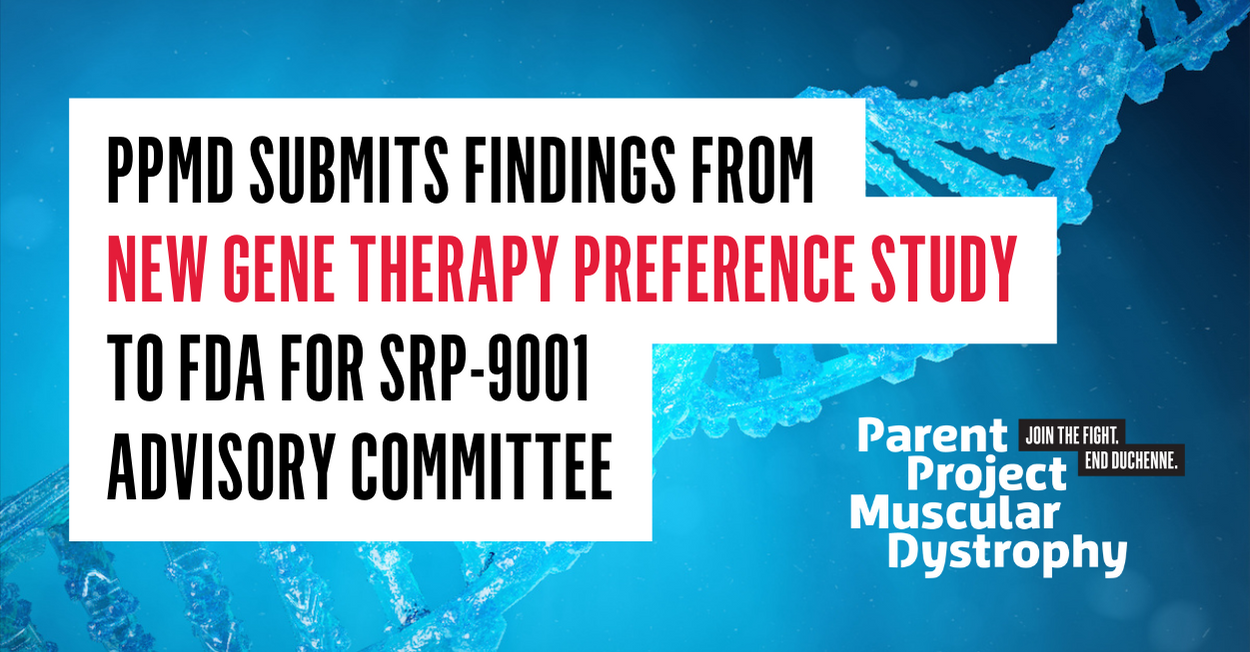
May 12 will be a historic day for the Duchenne community: the first FDA Advisory Committee meeting for a gene therapy specifically intended to treat Duchenne. PPMD, our community partners, and many others have long been optimistic that gene therapy could be a potential treatment for Duchenne. We are grateful to the FDA for calling for this meeting so that families can share their perspectives and preferences, and priorities.
During the meeting, the Advisory Committee will hear from the community during the Open Public Hearing (OPH) portion, and through written testimonies submitted in advance. If you haven’t already submitted written testimony to the committee, the deadline is today, May 5th. Submit your testimony today to advocate and have your voice heard.
While PPMD is disappointed that we were not selected to speak during the OPH, our written testimony submissions reflect our crucial belief that the patient voice must be captured and reflected in regulatory decisions, including during the review of SRP-9001.
PPMD’s Written Testimony Submissions to FDA
NEW PATIENT & CAREGIVER GENE THERAPY PREFERENCE STUDY FINDINGS
Caregiver and patient preferences must be taken into consideration and weighed when regulators decide whether to approve new therapies, as the final decision to accept risk in exchange for benefit will inevitably fall to the patients and caregivers of Duchenne. Understanding that the FDA must make their decisions supported by the data they have available to them, we strongly believe FDA should include relevant patient preference data in their final benefit-risk assessment of new potential therapies.
To that end, PPMD has submitted a summary of our work with Duchenne UK, a UK-based patient advocacy group, and social scientists at RTI International, through which we conducted a scientific, rigorous study capturing the Duchenne community’s views on risk tolerance to gene therapy. In our written testimony to the Advisory Committee, we have submitted a summary of the unpublished data which highlights the high risk tolerance of our community in exchange for a slowing of disease progression, a view we hope the agency will reflect on in weighing benefit-risk.
We strongly urge the FDA to take these results into account when reviewing SRP-9001. It is paramount that the agency acknowledges that this community is willing to accept significant risk in exchange for the slowing of disease progression as they evaluate potential therapies for Duchenne.
Read the full testimony >BUILDING ON DECADES OF DISCOVERY
PPMD’s Pat Furlong also submitted written testimony to the Advisory Committee, reflecting on the incredible progress made to date since her sons were diagnosed in 1984. For over four decades, our community has invested, researched, and committed to the fight to end Duchenne:
“The natural history of Duchenne is well-documented and the disease is well-characterized. Mutations in the DMD gene and their relationship with phenotype are better understood today and the role of dystrophin is well known. The micro-dystrophin construct, while not found in human nature, has been deliberately developed based on sequencing the variants from individuals with functional dystrophin in an effort to fully exploit critical domains of the dystrophin protein. Sarepta’s micro-dystrophin construct via AAVrh74, developed over 30 years and based on functional variants, is reasonably likely to provide benefit in our view.”
Building on over four decades of discovery, people living with Duchenne and their families are now waiting to move forward with dramatic and life-changing interventions such as gene therapy. We are hopeful that, factoring in the clinical evidence and unmet need in Duchenne that the committee will vote favorably for SRP-9001. We ask that the FDA thoughtfully weigh and factor in the voice and needs of the patient, and of their families when making their decision.
Read the full testimony >MAKE YOUR VOICE HEARD
If you haven’t already, there is still time to submit a written testimony to the committee to make sure your voice is heard in this process. Click here for additional information on how to submit your testimony before the end of day on May 5th.



 by: Parent Project Muscular Dystrophy
by: Parent Project Muscular Dystrophy

